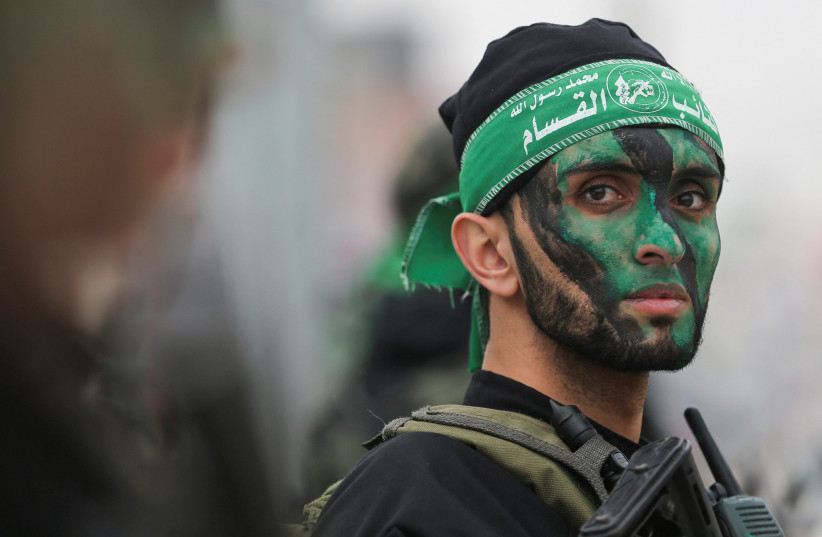The latest conflict between Palestinian Islamic Jihad and Israel in early May has changed nothing when it comes to the basic strategic equation in place between Israel and the Gazan terror factions.
The fact that Hamas stayed out of this latest campaign means that the stop clock has begun to the next escalation involving Gaza’s ruling faction.
It is time for Israelis to ask themselves what the government’s strategy is for dealing with Palestinian terror factions in Gaza. They should do so immediately and not wait again passively for the next escalation to occur to raise this question.
Public comments by government representatives who claim that Israel has changed the equation in Gaza are simply false. The basic equation in Gaza remains identical to the situation that existed before Operation Shield and Arrow, just as it has before and after every previous round of fighting between Israel and Gazan terror factions over the past 15 years.
The question that should be guiding Israel’s strategy is how to delay the next outbreak of violence from Gaza for many years, not months. The first step in moving in that direction is to create political leverage on top of Israel’s military achievements, rather than relying on the IDF’s capabilities alone to buy a little more quiet.

Israel's strategy for dealing with Palestinian Islamic Jihad
One answer for shaping a new Israeli strategy should involve the recruitment of a regional coalition of powerful actors, involving Saudi Arabia, the United Arab Emirates, Egypt and others, who would be significantly more involved in Gazan affairs. The goal of such a coalition would be to push for a long-term political arrangement between Hamas and Israel that would produce years of quiet.
As part of such an arrangement, Israel must also present to the world its legitimate demand that Hamas and Palestinian Islamic Jihad cease their continuous production of projectiles, whose sole intention is to terrorize, kill and injure Israeli civilians, while using Gazan civilians as human shields.
WHILE GAZA won’t disarm tomorrow, it is important to begin delegitimizing the war crimes of Gazan terror factions on the world stage and to counter the trend of normalizing such actions, which has become all too common in recent years.
The escalation was ultimately a highly limited campaign, which must not be confused with the main combat scenario for which Israel needs to prepare.
During the five-day escalation, Israeli air defenses performed well, intercepting more than 95% of projectiles heading for built-up areas – but not providing a hermetic defense, a fact that took on a tragic form in the killings of two civilians in Rehovot and the western Negev during the fighting.
This is another reminder that no hermetic air defense solution exists, despite the advanced technology, sensors, and interceptors that take on Gazan-made projectiles. These rockets can follow unusual trajectories, presenting real challenges for air defenses.
The Iron Dome has undergone continuous upgrades over the years. Today’s system covers far larger areas, deals with larger barrages and more threatening projectiles. It is only the same system as the one first unveiled in 2011 in name, not in substance or capabilities, and its evolution has been dramatic. No other air defense system in the world can even compare with the Iron Dome’s performance.
The Iron Dome forms one layer in Israel’s multi-layered air defense system, which also includes David’s Sling, the intermediate altitude system successfully employed for the first time during the May clashes, and the Arrow 2 and 3 systems against long-range ballistic missiles.
When the Iron Beam laser system becomes operational, an added layer of interception will become available to Israel’s air defenders.
If the Israel Air Force can establish that terror rockets are repeatedly destroyed before entering Israeli air space, this could have an eventual effect on the IDF’s policy of sounding sirens for every rocket launch, enabling Israel to decrease such sirens potentially.
For this change to take place, it will be necessary to prove that the laser system – at first the ground-based interceptors, which will take around two years to be fully operational, and later, the aerial version placed on drones – can truly make some of the sirens redundant.
Israel is not yet at this stage, however, and even the laser system does not offer the guarantee of hermetic defenses.
FURTHERMORE, it is essential to keep in mind that the significant military threat facing Israel is the prospect of a multi-arena conflict involving Iran and its array of ballistic and cruise missiles, and UAVs; Hezbollah, with its mammoth projectile arsenal; Hamas in Gaza, and others.
Such a scenario, which would be a completely different challenge to the Israeli home front, compared to the most recent escalation, needs to be placed on the Israeli public agenda now. It is the threat that Israel needs to focus on.
The danger of public complacency based on the misunderstanding that this conflict is indicative of all of Israel’s future wars is real.
The writer, a retired brigadier-general, is a publishing expert with The MirYam Institute. He served as the commander of the Israel Air Defense Forces from 2015-2018, during which time the David’s Sling and Arrow 3 systems became operational.
